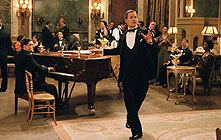|
|
|
|
De-Lovely
|
 |
|
The ghost of philosopher Jacques Derrida (who died in October 2004) haunts De-Lovely, a highly stylised biopic of the famed American songwriter Cole Porter. There is a bravely conceived scene in this movie where Porter (Kevin Kline) and his wife, Linda (Ashley Judd), watch Night and Day (1946) – Hollywood's first, infamously air-brushed attempt at telling the same real-life story. Of course, Cole and Linda – echoing the sentiments of many a modern-day spectator – mock the romantic falsification they see on screen. But who is to say that De-Lovely is any closer to the truth of Porter's life and times? From this paradoxical, truly deconstructive juncture, the whole film begins to unravel. At one level, this is an attempt to show the Porter suppressed in that 1946 film – promiscuously gay, cynical, sometimes subversive in the naughty messages he slipped into popular songs. Centrally, there is Porter's supposedly progressive, open marriage to Linda, an arrangement that did not rule out deep, mutual affection. But how to tell such a story in this age of the witheringly self-conscious musical, after Bob Fosse's Chicago (2002) and Dennis Potter's The Singing Detective (2003)? Director Irwin Winkler and writer Jay Cocks, both closely associated in the past with Martin Scorsese, may well have taken their inspiration from Gershwin, an unfilmed, mid '80s Scorsese-De Niro project. In that frankly experimental piece, as screenwriter Paul Schrader described it, "chronological thematic chapters with titles like Women, Classical, Hollywood, Psychoanalysis" would each be capped off with a different performer interpreting a Gershwin song (Schrader on Schrader, Faber, 1990, p. 130). Winkler and Cocks spin a more linear narrative, but they hold to the same musical concept, with superfluous guest stars including Elvis Costello, Alanis Morissette and Robbie Williams. The film, for all its lavish effort, adds up to very little. Winkler smarmily opts for a heavily ironic reading of standards like "Be a Clown" and "Just One of Those Things". Such an anti-musical, anti-entertainment impulse needs the politicised conviction of a Lars von Trier (Dancer in the Dark [2000]); here, it ends up seeming merely unpleasantly grotesque. The film's mildly surreal framing device – in which a mysterious visitor unsubtly named Gabe (Jonathan Pryce) sits with the elderly Porter and reviews his life as magically projected onto a movie screen – is terribly leaden, despite its hip nod to Citizen Kane (1941) and all subsequent postmodern biopics. Worst of all, De-Lovely loses its nerve. Like W. C. Fields or Andy Warhol, Porter presents both an intractable difficulty and an irresistible challenge to the Hollywood biopic machine: can this cold, calculating, elusive man be finally redeemed by love, forgiveness and honesty? But that makes Porter just like every other Great American Hero; it would be better by far if he remained a fearsome, unmanageable anti-hero right to the end. MORE Winkler: At First Sight, The Net, Night and the City MORE showbiz biopics: Auto Focus, The Life and Death of Peter Sellers, Gods and Monsters MORE biopics: Ali,The Aviator, Basquiat, Heart Like a Wheel, I Shot Andy Warhol, Kundun, Man on the Moon, Malcolm X, Nixon, The People vs. Larry Flynt, Pollock, What's Love Got to Do With It? © Adrian Martin November 2004 |
![]()